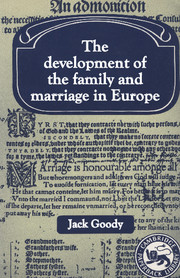Book contents
- Frontmatter
- Contents
- List of figures, maps and tables
- Preface
- 1 Perspectives
- 2 Two sides to the Mediterranean
- 3 Change in the German lands
- 4 Cousins and widows, adoptees and concubines
- 5 From sect to Church
- 6 Church, land and family in the West
- 7 Reformation and reform
- 8 The hidden economy of kinship
- 9 The spiritual and the natural
- Appendix 1 Kin groups: clans, lineages and lignages
- Appendix 2 From brideprice to dowry?
- Appendix 3 ‘Bilaterality’ and the development of English kin terminology
- References and bibliography
- Glossary
- Index
Appendix 1 - Kin groups: clans, lineages and lignages
Published online by Cambridge University Press: 05 June 2012
- Frontmatter
- Contents
- List of figures, maps and tables
- Preface
- 1 Perspectives
- 2 Two sides to the Mediterranean
- 3 Change in the German lands
- 4 Cousins and widows, adoptees and concubines
- 5 From sect to Church
- 6 Church, land and family in the West
- 7 Reformation and reform
- 8 The hidden economy of kinship
- 9 The spiritual and the natural
- Appendix 1 Kin groups: clans, lineages and lignages
- Appendix 2 From brideprice to dowry?
- Appendix 3 ‘Bilaterality’ and the development of English kin terminology
- References and bibliography
- Glossary
- Index
Summary
In drawing his contrast between Eastern and Western structures, Guichard expresses a common view when he describes the Eastern mode of descent as ‘strictly patrilineal (only kinship in the paternal line is reckoned)’, the Western as ‘clearly bilineal’ (i.e. cognatic), great importance being attached to the maternal family and to affinity. On the other hand the medievalist, Duby, analyses the growth of the agnatic lignage in the eleventh century, while Stone, the English historian of the early modern period, writes approvingly of the changes in England from 1560 to 1640 as a ‘shift from a “lineage society” characterized by bounded horizons and particularized modes of thought, to the more universalistic standard of values of a “civil society”’ (1977: 134). The disagreement as to the structure of European kin groups goes back to earliest times, for while writers like Philpotts (1913) and Lancaster (1958) have emphasised the bilateral nature of Anglo-Saxon kinship, Charles-Edwards has insisted upon the presence of agnatic lineages (1972).
The discussion is confusing firstly because of the way in which the terms are used and secondly because of the hidden assumptions about the nature of the opposition between, say, agnatic and cognatic or between extended and conjugal families. In many cases the arguments can be resolved by a sharper definition of terms and by appreciating that a system of agnatic clans or lineages does not exclude the active presence of bilateral kinship.
- Type
- Chapter
- Information
- The Development of the Family and Marriage in Europe , pp. 222 - 239Publisher: Cambridge University PressPrint publication year: 1983
- 1
- Cited by

